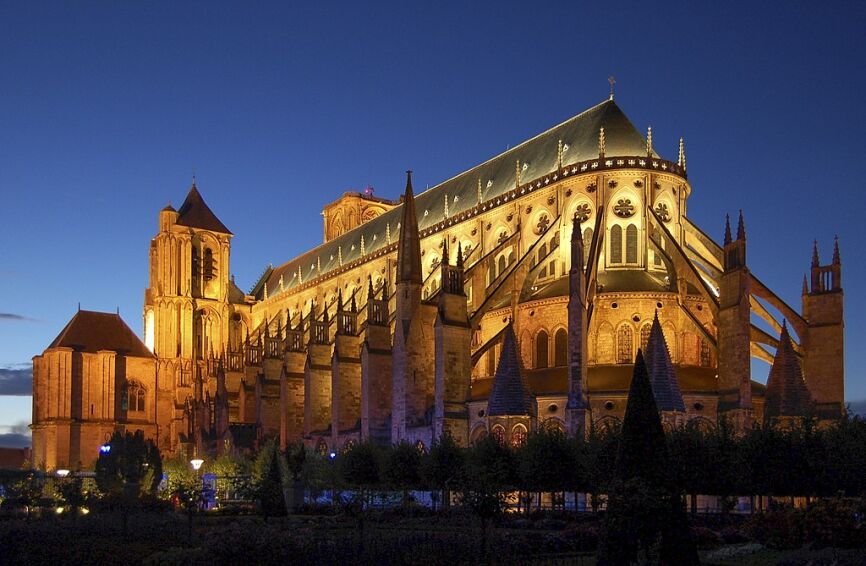 新闻
新闻 
Bourges, European capital of culture in 2028: revenge of French average-size cities
Paris is in France, but Paris is not France! And major French cities such as Marseille, Lyon, Toulouse, Lille or Bordeaux do not make the whole of France. There also “average-size cities”, middle in their size, but certainly not average in their dynamism and openness, particularly when it comes to welcoming international students. And it’s also the case for Bourges, a city located in the centre of the country which has been elected European capital of culture for 2028!
In the wake of the deliberation of a European jury, the French ministry of Culture in charge of organising the national selection for this initiative by the European Union and implemented by the European Commission, has held a press conference on 13 December to announce the name of the French city laureate of the title of European Capital of Culture 2028. And the French city of Bourges was nominated to become this capital, with České Budějovice in Czech Republic and Skopje in North Macedonia. It is the fifth city in France to obtain this title after Marseille-Provence, Lille, Avignon and Paris. The title of European Capital of Culture, a European action launched in 1985 aims at “promoting the diversity of cultures in Europe and place culture at the heart of the development of a city over the long term”.
Tom Thumb becomes a giant
According to the mayor of Bourges who heartedly supported the application of his city, Bourges was “the Tom Thumb of the competition” compared to three additional cities also applying: Montpellier-Sète, Rouen and Clermont-Ferrand. “We are an average-size city with less than 100,000 inhabitants, competing with major cities with an influence and attractiveness Bourges had not,” said the mayor.
This choice was backed up by the French Minister for Culture, who described it as “the gamble of a medium-sized town that relies on culture for its human, social and economic development, and that aims to make a real place for all audiences”.
The city of Bourges’ project won the jury over “despite sharp competition”.
According to the chairwoman of the European jury, made up of twelve members including two from France, the selection process “was extremely difficult, with intense and profound debates”.
The city of Bourges was simply “the city that best met the criteria” set by the European Commission, i.e.:
a contribution to the city's long-term development, the cultural and artistic content, the European dimension, the involvement of civil society and the projected budget for the event.
Be that as it may, according to the President, the entries from the four French candidate cities “were truly enchanting, enriching our perception of contemporary France”.
A common and collaborative project
The project presented by the city of Bourges is part of the “Territoire d’avenir” (promising region) initiative presented as a “laboratory of regions combining culture, inclusion and ecology” which will become an “extraordinary lever for attractiveness”. This project is “participative and collaborative” and relies on two main pillars:
- Creating a new common language about European artistic production: the city aims at becoming “a European city of artists and authors”. This city intends to become a true resource centre, offering among others support services in the legal areas of intellectual property, copyrights and intellectual rights, but also a service of translation into the languages of the European Union, a service dedicated to international mobility and other supports in relation with social rights (parental leaves, retirement, accommodation);
- building a network of medium-sized towns: for the project’s sponsors, “small and medium-sized towns are promising territories and the backbone of the European Union”. As such, Bourges wants to promote “a network of 15 towns on a human scale, in the Centre-Val de Loire region, in France and in Europe, to exchange ideas on common issues, learn from best practice and work together to imagine the town of the future”.
To be also noted that the cultural programme of Bourges 2028 is “strongly committed to a low carbon impact and is in line with the European Union’s 2030 climate and societal objectives”. A dedicated team within the project’s governance will be “in charge of the carbon footprint and monitoring projects from the design phase through to completion”. By way of example, Bourges 2028 wants to develop a “programme of cultural night trains that will travel throughout Europe, with routes linking France and its neighbouring countries and other European Capitals of Culture”.
Explore more
- on the Ministry of Culture website:
https://www.culture.gouv.fr/Actualites/Bourges-designee-Capitale-europeenne-de-la-Culture-2028 - on the city of Bourges website:
https://www.ville-bourges.fr/site/bourges-capitale-europeenne-de-la-culture
press kit of the application:
https://www.ville-bourges.fr/__medias__/files/pdfs/presentation-bourges-2028.pdf





Commentaires
Vous devez être connecté pour laisser un commentaire. Connectez-vous.